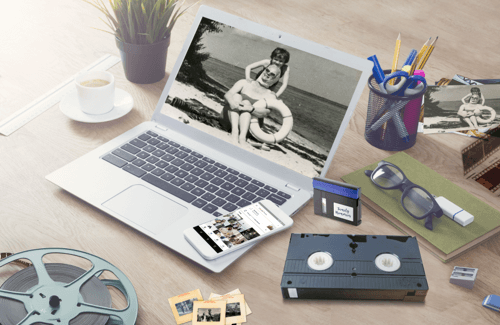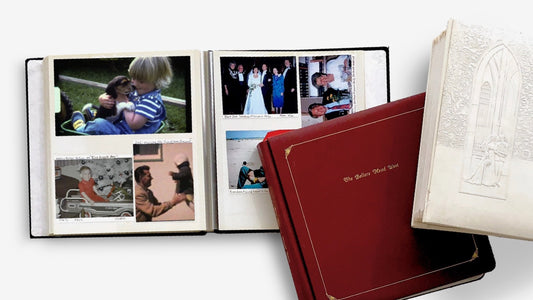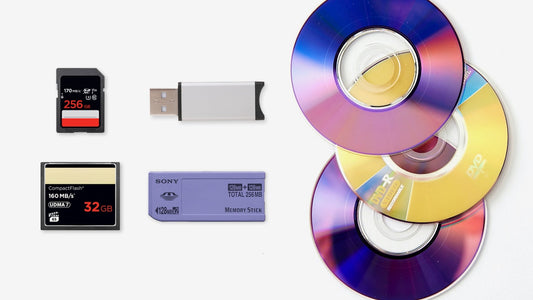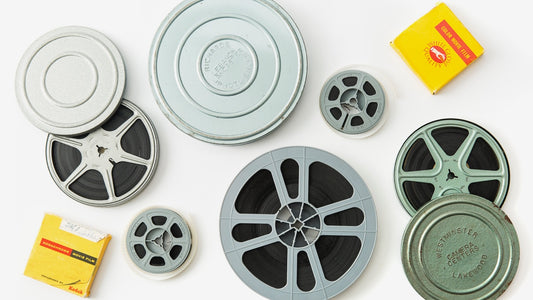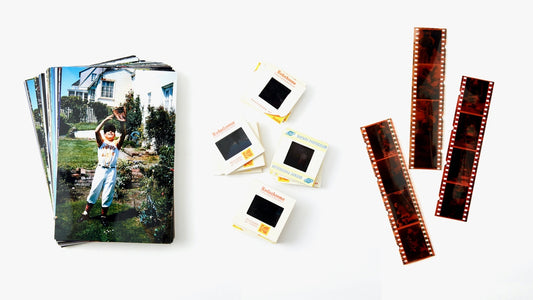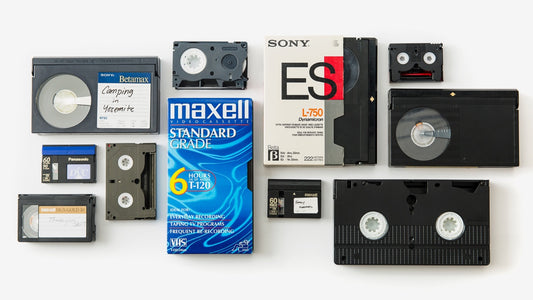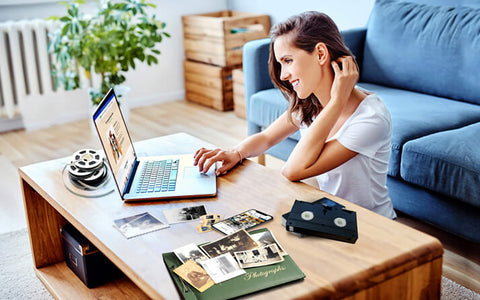Those dusty boxes of 8mm film reels hold a lifetime of memories, but they aren't getting much love in storage. It’s time to bring them into the present when you digitize 8mm film. Forget about clunky projectors. Instead, get instant access to your family’s precious moments on your phone, computer, or TV. This isn't just about convenience; it's about preservation. Film is fragile and fades over time. Digitizing ensures those irreplaceable memories are safe for future generations. Here, we'll cover the best ways to convert your films and make the most of your new digital library.
Key Takeaways
- Digitizing 8mm film safeguards memories: Easily shareable digital formats protect fragile films from deterioration and ensure future generations can enjoy them.
- Weigh the pros and cons of DIY versus professional digitization: Consider your technical skills, budget, and desired quality when making your decision.
- Preserve both digital and physical copies: Utilize cloud storage or external drives for digital files and store original reels in a controlled environment to maximize their lifespan.
Why You Should Digitize Your 8mm Film
Those old 8mm films tucked away in boxes hold a treasure trove of memories. But let's be honest, how often do you actually watch them? Digitizing your 8mm films breathes new life into those precious moments, transforming them into a format easily accessible and shareable. Think of it as unlocking those memories and bringing them into the present.
One of the biggest benefits is the sheer convenience. Once digitized, your films are viewable on any modern device—your phone, tablet, computer, or even your smart TV. No more fussing with clunky projectors and tangled reels. Sharing becomes a breeze, too. You can easily upload your digital films to online platforms, download them to share directly, or even create custom DVDs. Imagine emailing a funny clip from your childhood birthday party to your siblings or posting a heartwarming family vacation video on social media.
Beyond convenience, digitization is about preservation. 8mm film is fragile. Over time, it can deteriorate, fade, or become damaged. By converting your films to digital, you're creating a lasting archive, protecting them from the ravages of time. YesVideo handles your original films with care, ensuring they are returned safely. You get the best of both worlds—preserved originals and readily available digital copies. It's peace of mind knowing those irreplaceable moments are safe and sound.
Finally, consider the changing technological landscape. Finding a working 8mm projector is becoming increasingly difficult. Digitizing your films ensures future generations can experience these memories. It's about creating a legacy that can be cherished for years to come. Think of the joy your children and grandchildren will experience watching those home movies, connecting with their family history. Digitization isn't just about preserving memories; it's about sharing them with the people you love, both now and in the future.
DIY or Pro Service: Which Is Right for You?
So, you've got boxes of old 8mm films and you're finally ready to bring those memories back to life. You're probably wondering whether to tackle digitization yourself or hire a professional service. Both options have their pros and cons regarding quality and cost, so let's break it down.
Your At-Home Digitizing Options
Digitizing your 8mm films yourself can seem appealing, especially if you're on a tight budget. Several DIY methods are available, from purchasing a dedicated film scanner to using a projector and video camera setup. You can find devices like the Kodak Scanza and Wolverine film converters online, often at lower price points. However, user reviews on sites like Reddit often highlight drawbacks. Many users report issues with incorrect frame rates, subpar image quality, and even the risk of damaging your precious film. DIY methods also require a significant time investment and technical know-how. Scanning each frame can be tedious, and if you're not careful, you could end up with lower quality digital copies than you'd hoped for.
The Hidden Workload: Editing and Color Correction
Going the DIY route means you're not just the scanner operator; you're also the video editor. The scanning itself is only the first step. Afterward, you're left with raw footage that often needs significant post-production work to look good. This includes stabilizing shaky shots, adjusting the frame rate so the playback doesn't look choppy, and performing detailed color correction. Old film often develops a color cast—turning overly blue or red—and restoring the natural tones requires a keen eye and specialized software. This hidden workload can be a major time sink and requires technical skills that go beyond simply feeding film into a machine.
Understanding the Risks of DIY Scanners on Fragile Film
While a DIY scanner might seem like a budget-friendly choice, it’s crucial to weigh the potential risks to your irreplaceable films. Many at-home scanners produce lower-quality results, leaving you with a digital version that lacks the clarity and color of the original. More concerning is the potential for physical damage. Older films can be especially fragile; they become brittle, shrink, or have weak splices over the years. A consumer-grade machine might not handle this delicate media gently enough, leading to tears or jams. A professional film transfer service uses specialized equipment and has technicians trained to handle delicate media, ensuring your memories are protected during the process.
Letting the Experts Handle It
Professional services like YesVideo take the hassle and risk out of converting your 8mm film. While the upfront cost might be higher than DIY methods, you're paying for expertise, quality, and peace of mind. YesVideo handles your films with care, using a hand-processed approach in US-based facilities. This ensures your original reels are protected and the resulting digital copies are top-notch. Plus, the turnaround time is generally quick. Many professional services, including Legacybox, also offer additional features like cloud storage and digital downloads, making it easy to share memories with family and friends. If preserving your memories in the best possible quality is your priority, professional conversion services offer a reliable and convenient solution. They handle the technical aspects, so you can focus on reliving and sharing those special moments.
Equipment Quality: Why a Pro Scan Is Different
When you hand over your irreplaceable films, you want to know they’re in good hands. The difference between a home scanner and professional equipment is significant. Professional services use high-end, frame-by-frame scanners designed specifically to handle delicate, aging film without causing damage. At YesVideo, every reel is processed by hand in the USA, ensuring each moment is captured with precision and care. This professional approach not only protects your film from the heat and potential tearing common with consumer-grade devices but also results in a much higher-quality digital file. You’re not just paying for a scan; you’re investing in the expertise and technology needed for a proper film transfer that preserves the integrity of your memories.
Choosing the Right Resolution: HD vs. 2K Scans
Resolution determines the clarity and detail of your digital videos. While standard definition might seem adequate, 8mm film holds more visual information than you might think. Opting for a High Definition (HD) scan from a professional service can make a world of difference, revealing sharper details and richer colors that bring your old footage to life. Most DIY scanners simply can't capture this level of quality. Professional services like YesVideo offer HD scanning to ensure your digitized memories look their best on modern TVs and devices. Choosing a higher resolution means you’re getting the most out of your original films, creating a final product that’s truly worth sharing and cherishing for generations.
Our Top Picks for 8mm to Digital Converters
Picking the right converter depends on your tech skills, budget, and how much control you want. Let's look at some popular options, from DIY devices to full-service pros.
All-in-One Film Scanners
The Best 8mm to Digital Converters We've Found
Picking the right converter depends on your tech skills, budget, and how much control you want. Let's look at some popular options, from DIY devices to full-service pros.
Our Favorite All-in-One Scanners
These devices digitize your films without a computer, making them a good choice for a simple and direct approach.
For High-Quality Scans: The Wolverine Titan
The Wolverine Titan is a favorite for its user-friendliness and ability to handle various film formats. It's a solid option if you want a quick and easy way to convert your 8mm films. You can learn more about digitizing film with standalone converters on sites like Scanplify.
A Trusted Name: The KODAK Scanza
The KODAK Scanza creates digital MP4 files directly, but it can be a bit technical. While compact, the quality of the digital copies might not be as high as other options. This might be a good fit if you're tech-savvy and prioritize portability. For a different approach, consider professional film transfer services like those offered by YesVideo.
The Versatile Magnasonic All-in-One
The Magnasonic Super 8/8mm Film Scanner has a built-in LCD screen, making it easy to view and convert your films. It's an all-in-one solution that's generally user-friendly, offering a convenient way to digitize your collection. NerdTechy offers helpful reviews of various film scanners.
For Mac Users: Elgato Video Capture
Elgato Video Capture offers more flexibility, converting various video formats, including 8mm film, but it requires a computer. This is a good option if you're comfortable using software and want more control. You can find more information about 8mm film converters on Scanplify.
Simple and Direct: The ClearClick Converter
Designed for home users, the ClearClick Video to Digital Converter has a simple interface and supports multiple formats. It's a good choice if you're looking for an easy and effective way to digitize your films without a lot of fuss.
Using Software to Digitize Your Film
Software solutions often involve extra hardware and can be more complicated. They do, however, offer more flexibility for editing and output formats, which might appeal to those who want a more customized result.
Top-Rated Professional Digitizing Services
If you'd rather leave it to the experts, professional services offer a hassle-free way to get high-quality digital copies of your 8mm films.
YesVideo: A Popular Choice
YesVideo specializes in digitizing all kinds of film reels—8mm, Super 8, and 16mm—with a fast turnaround time and a focus on quality. Check out their film transfer services for a hands-off approach.
Legacybox: The All-Inclusive Kit
Legacybox prides itself on a careful, hands-on digitization process for 8mm and Super 8 film. They're a good choice if quality is your top priority. Learn more about their services on the Legacybox website.
Southtree: Simple and Straightforward
Southtree offers a comprehensive film transfer service with various digital storage options. Visit the Southtree website for more details.
iMemories: Cloud Access Included
iMemories digitizes old films and offers convenient cloud storage and physical copies. This is a good option if you want easy access to your digital files. Explore their services on the iMemories website.
Memories Renewed: For Damaged Film
Memories Renewed specializes in converting various film formats to digital, emphasizing high-quality preservation. Visit the Memories Renewed website for more information.
Resolution and image quality are key factors when choosing an 8mm film converter. Look for converters that offer MP4 format with 1080p Full HD resolution. This is generally considered excellent quality for 8mm film and ensures your digital copies retain detail and clarity, making them great for viewing on TVs, computers, and mobile devices.
What to Look For: Ease of Use
Even with great specs, some converters can be tricky to use. A user-friendly interface is essential for a smooth conversion process. If you're not tech-savvy, read reviews and look for converters known for their simplicity. Services like YesVideo handle the technical side for you, so you don’t have to worry about complicated equipment or software.
What to Look For: Ease of Use
When you're deciding how to digitize your 8mm films, how easy the process is should be a top consideration. If you're not a tech whiz, a user-friendly solution can save you a ton of frustration. While DIY methods might seem like a good way to save money, they often have a steep learning curve. You'll find plenty of user reviews mentioning issues like incorrect frame rates and grainy image quality, which can lead to disappointing results. Even worse, you could risk damaging your irreplaceable films with equipment you're not used to, turning a fun project into a stressful one.
This is where professional services like YesVideo really shine, taking the guesswork and risk out of the equation. When you let an expert handle it, you're paying for their experience and quality control, which means you can focus on reliving your memories instead of wrestling with complicated gear. YesVideo, for example, uses a careful, hand-processed approach in their US-based labs to transfer your film. This ensures your original reels are treated with care and returned to you safely, giving you a reliable and straightforward way to preserve your memories in the best possible quality.
Do You Need a Built-in Screen?
Many 8mm film converters now include built-in screens, usually between 2.4" and 5". These screens let you preview your films as you convert them, so you can check the quality and make sure everything is working correctly. This is a handy feature that can save you time and frustration.
Checking File and Format Compatibility
Think about what you want to do with your digitized films. Do you want to download them, store them online, or easily share them with family? Consider a service like YesVideo, which provides digital copies and access to a MemoryCloud for viewing, downloading, and ordering extra copies.
Will It Scan Your Type of Film?
Not all film is created equal! Make sure the converter or service you choose is compatible with your type of film. Whether you have 8mm, Super 8, or 16mm film, you’ll want to confirm compatibility upfront. YesVideo, for example, handles all these formats. Knowing this in advance will save you headaches down the road.
How Much Does It Cost to Digitize 8mm Film?
Deciding how to digitize your 8mm films often comes down to balancing cost and convenience. Let's break down the expenses associated with DIY methods versus using a professional service.
Breaking Down the Cost of DIY
Digitizing your 8mm films yourself might seem like the cheaper route, and in some ways, it can be. The initial investment involves purchasing a converter. Prices range from around $150 for basic models to upwards of $400 for more advanced options with added features. Remember, this is a one-time cost, unlike per-reel or per-foot charges from professional services.
However, consider the hidden costs. If your projector is dusty or your film is brittle, you might need to invest in cleaning supplies or splicing tools. These can add up. Also, factor in your time. Converting film yourself is a time-intensive process, especially if you have a large collection. For example, if you have several reels of film, the time spent cleaning, splicing, and converting each reel could quickly add up.
Understanding Professional Service Costs
Professional services like YesVideo handle everything for you, from carefully handling your films to creating high-quality digital transfers. This convenience comes at a price, typically calculated per reel or per foot of film. Expect to pay anywhere from $10 to $30 per reel, depending on the service and any additional features like enhanced image quality or specific file formats.
While the per-reel cost might seem higher than the initial investment in a DIY converter, consider the value of professional expertise. Services like YesVideo specialize in handling delicate film, minimizing the risk of damage and ensuring optimal image quality. Plus, you save significant time and effort. For a precise quote based on your specific needs, check out YesVideo's price list. Ultimately, the best choice depends on your budget, the size of your film collection, and how much value you place on your time and peace of mind.
Comparing Price Points: Per-Reel vs. Box-Based Models
When you opt for a professional service, you'll generally find two pricing structures: per-reel or a flat-rate box. A per-reel model, which YesVideo uses, charges you for each reel of film you send in. This is a great option if you know exactly how many reels you have and want a clear, upfront cost based on your collection's size. Prices can range from $10 to $30 per reel, depending on the service. The other common option is a box-based model, where you fill a pre-paid box with as much media as it can hold. This can be a good deal if you have a mix of formats, like film reels, videotapes, and photos, and prefer a single price for everything. The best choice really depends on what’s in your collection.
Watch Out for Additional Costs and Fees
Whether you go the DIY route or hire a pro, it’s smart to be aware of potential extra costs. If you’re converting film yourself, you might need to buy cleaning supplies or splicing tools to repair brittle film, which can add up. Don't forget to factor in the value of your own time—digitizing a large collection can take hours, if not days. With professional services, be sure to check for fees for things like extra digital downloads, USB drives, or DVD copies. Some companies might also charge more for higher-resolution scans or for handling film that needs special care. Always read the fine print so you know the full cost before you commit.
A Practical Tip for Managing Large Projects
If you're staring at a mountain of film reels, the thought of digitizing it all can feel overwhelming. My advice? Start small. Send a few of your favorite or most important reels to a professional service first. This lets you see the quality of the digital transfer and get comfortable with the process before committing your entire collection. For large projects, a service like YesVideo is a huge time-saver because they handle all the technical work, like color correction and frame rate adjustments, which is a massive task if you do it yourself. Breaking up a big project into smaller batches not only makes it more manageable but can also help spread out the cost over time.
Your Step-by-Step Guide to Digitizing Film at Home
Converting 8mm film to digital at home might seem like a budget-friendly way to preserve precious memories. It's tempting to go the DIY route, but it's important to understand the potential drawbacks. While affordable home converters, like those from Kodak and Wolverine, are readily available, they often fall short on performance. Online discussions are filled with frustrated users reporting issues ranging from inaccurate frame rates and poor image quality to the risk of damaging the original film during conversion. One Reddit discussion highlights these concerns, with many users advising against these cheaper devices.
If you're still considering DIY, options like the Kodak Scanza can create digital MP4 files. However, be prepared for a learning curve. These methods often require some technical skills and may produce lower-quality digital copies compared to professional services, like those offered by YesVideo. Remember, scanning film frame by frame is a painstaking and potentially risky process that could jeopardize your original film. If you choose this path, set aside sufficient time and be prepared to put in the effort. You might also need video editing software to correct frame rates and improve the final product.
What Happens When You Send Your Film to a Pro?
A Look Inside the YesVideo Process
When it comes to preserving precious family memories captured on 8mm film, entrusting the digitization process to professionals ensures the best possible results. YesVideo stands out as a leader in this field, offering a specialized film transfer service designed to handle these delicate reels with the utmost care. With over two decades of experience, they've honed their process to deliver high-quality digital conversions, typically within 30 days. What sets YesVideo apart is their commitment to protecting your original films, guaranteeing no damage during the transfer.
YesVideo's pricing is comprehensive, covering a range of services that contribute to the final product's quality. This includes cleaning your film to remove mold, dust, and dirt, as well as repairing any breaks or splices. They even consolidate your film onto 7-inch plastic reels for easier handling and storage. You can find more details about what's included on their pricing page. Another advantage of choosing YesVideo is their seamless integration with Google Photos, saving your digitized memories directly to your account for easy access and sharing. This combination of expert handling, meticulous attention to detail, and convenient digital delivery makes YesVideo a compelling choice for professional 8mm film digitization.
Specialized Services for Your Film
If the thought of handling fragile, decades-old film gives you pause, you're not alone. This is where professional services shine. Choosing a company like YesVideo means you're not just paying for a digital file; you're investing in expertise and peace of mind. We take the risk and guesswork out of the equation. With over 20 years of experience, we've perfected a hand-processed approach right here in our US-based facilities. This careful handling ensures your original reels are protected from start to finish, and the resulting digital copies are the highest possible quality. A professional film transfer is the best way to ensure your irreplaceable memories are preserved safely and beautifully.
Handling Film with Sound
Did you know some of your films might have sound? Super 8 film, in particular, sometimes features a magnetic stripe along the edge that holds an audio track. Capturing this audio requires specialized equipment that most at-home converters simply don't have. Attempting to digitize it yourself often means losing the sound forever, leaving you with a silent movie. Professional services are equipped to handle these complexities. They use advanced scanners that capture both the video and the audio simultaneously, ensuring your home movies are preserved exactly as you remember them, with every laugh and spoken word intact. This is one of the key advantages of letting an expert manage the conversion.
Advanced Options for Scratched Film
Over the years, film can become brittle, dirty, or scratched. These imperfections can show up in the final digital version, especially with basic home scanners. Professional services offer solutions that go beyond simple scanning. At YesVideo, for example, our process includes carefully cleaning your film to remove dust and grime before it's digitized. We also repair any old, broken splices to ensure a smooth playback experience. This preparation step is crucial for getting the clearest possible picture. While deep scratches may still be visible, professional-grade equipment and careful handling can significantly improve the quality of older, more delicate films, giving your memories the careful attention they deserve.
How to Save and Share Your Digital Memories
After investing time and resources in converting those precious 8mm films to digital, safeguarding and sharing your newly digitized memories is key. Let's explore some smart strategies for both.
The Best Ways to Store Your Digital Films
Think about how you'll store and access your memories long-term. External hard drives or USB flash drives offer portable, offline solutions. Cloud storage services like Google Photos, iCloud, or Dropbox provide convenient backup and accessibility across multiple devices. Many professional digitization services, including YesVideo, offer integrated solutions. YesVideo provides digital downloads coupled with access to their MemoryCloud, a platform designed for viewing, downloading, and even ordering extra physical copies. You can also save your digitized films directly to your Google Photos account from YesVideo's MemoryCloud, streamlining organization and access.
Understanding Digital Backup Policies
When you choose a professional service to digitize your films, it's smart to look at their digital backup policy. This isn't just about getting a file; it's about how you can access and manage your memories moving forward. A good policy gives you flexibility and security. For example, when you use a service like YesVideo, you get more than just a digital download. You also get access to their MemoryCloud, a secure online platform where you can view your digitized films, download them anytime, and even order extra DVDs or USBs for family members. This integrated approach ensures your memories are not only preserved in high quality but are also easy to access and share for years to come.
Long-Term Archival: Beyond Hard Drives
Once your films are digitized, your preservation work isn't quite done. Simply saving the files to your computer or a single external hard drive isn't enough for true long-term security. Hard drives can fail, and technology evolves. For robust, long-term archival, consider the 3-2-1 backup rule: keep at least three copies of your files, on two different types of storage media, with one copy located off-site. This could mean having one copy on your laptop, a second on an external drive, and a third in the cloud. For those serious about preserving memories for decades, some people even look into specialized options like LTO data tapes, which have a much longer lifespan than consumer hard drives. The goal is to create a secure archive that will protect your family's history for future generations to enjoy.
Let's Talk Budget: The Cost to Digitize Film
Deciding how to digitize your 8mm films often comes down to balancing cost and convenience. Let's break down the expenses associated with DIY methods versus using a professional service.
The Financial Side of a DIY Project
Digitizing your 8mm films yourself might seem like the cheaper route, and in some ways, it can be. The initial investment involves purchasing a converter. Prices range from around $150 for basic models to upwards of $400 for more advanced options with added features. Remember, this is a one-time cost, unlike per-reel or per-foot charges from professional services.
However, consider the hidden costs. If your projector is dusty or your film is brittle, you might need to invest in cleaning supplies or splicing tools. These can add up. Also, factor in your time. Converting film yourself is a time-intensive process, especially if you have a large collection. For example, if you have several reels of film, the time spent cleaning, splicing, and converting each reel could quickly add up.
How Professional Services Bill You
Professional services like YesVideo handle everything for you, from carefully handling your films to creating high-quality digital transfers. This convenience comes at a price, typically calculated per reel or per foot of film. Expect to pay anywhere from $10 to $30 per reel, depending on the service and any additional features like enhanced image quality or specific file formats.
While the per-reel cost might seem higher than the initial investment in a DIY converter, consider the value of professional expertise. Services like YesVideo specialize in handling delicate film, minimizing the risk of damage and ensuring optimal image quality. Plus, you save significant time and effort. For a precise quote based on your specific needs, check out
So, you’ve decided to convert those precious 8mm films to digital. Smart move! But before you dive in, let's talk about finding the best possible deal. Nobody wants to overspend, especially when preserving irreplaceable memories.
How to Find Deals and Discounts
How the Pros Digitize Your 8mm Film
How YesVideo Handles Your Memories
When it comes to preserving precious family memories captured on 8mm film, entrusting the digitization process to professionals ensures the best possible results. YesVideo stands out as a leader in this field, offering a specialized film transfer service designed to handle these delicate reels with the utmost care. With over two decades of experience, they've honed their process to deliver high-quality digital conversions, typically within 30 days. What sets YesVideo apart is their commitment to protecting your original films, guaranteeing no damage during the transfer.
YesVideo's pricing is comprehensive, covering a range of services that contribute to the final product's quality. This includes cleaning your film to remove mold, dust, and dirt, as well as repairing any breaks or splices. They even consolidate your film onto 7-inch plastic reels for easier handling and storage. You can find more details about what's included on their pricing page. Another advantage of choosing YesVideo is their seamless integration with Google Photos, saving your digitized memories directly to your account for easy access and sharing. This combination of expert handling, meticulous attention to detail, and convenient digital delivery makes YesVideo a compelling choice for professional 8mm film digitization.
Saving and Sharing Your Newly Digitized Films
After investing time and resources in converting those precious 8mm films to digital, safeguarding and sharing your newly digitized memories is key. Let's explore some smart strategies for both.
Where to Safely Store Your Digital Files
Think about how you'll store and access your memories long-term. External hard drives or USB flash drives offer portable, offline solutions. Cloud storage services like Google Photos, iCloud, or Dropbox provide convenient backup and accessibility across multiple devices. Many professional digitization services, including YesVideo, offer integrated solutions. YesVideo provides digital downloads coupled with access to their MemoryCloud, a platform designed for viewing, downloading, and even ordering extra physical copies. You can also save your digitized films directly to your Google Photos account from
Easy Ways to Share Films with Family and Friends
Sharing your digitized 8mm films should be effortless. With digital files, you can easily upload your home movies to social media platforms like Facebook or YouTube to share with a wider audience. For more private sharing, email or messaging apps work perfectly. Services like YesVideo simplify this process, providing a platform for easy sharing directly from their service. Plus, if you've saved your films to a cloud storage service like Google Photos, sharing across devices and with specific individuals is incredibly simple. This way, everyone can relive those special moments, no matter where they are.
What's the best way to store and share my digitized 8mm films? External hard drives and USB drives offer portable offline storage. Cloud services like Google Photos, iCloud, and Dropbox provide convenient backup and accessibility. For sharing, consider social media platforms, email, messaging apps, or services like YesVideo's MemoryCloud, which allows direct sharing from their platform. Many services also offer DVD creation options for a physical keepsake.
Frequently Asked Questions
Why is digitizing old 8mm films important? Digitizing your 8mm films safeguards them from deterioration and makes them easily accessible on modern devices. It's a way to preserve family history and easily share those memories with loved ones near and far. Plus, it eliminates the need for outdated equipment like projectors, which are becoming harder to find.
What's the difference between DIY and professional 8mm film conversion? DIY methods involve using a film scanner or projector/camera setup, requiring technical skills and a significant time investment. The quality can be unpredictable, and there's a risk of damaging your films. Professional services offer expertise and specialized equipment, resulting in higher-quality digital copies and peace of mind, but come at a higher cost.
What are my options for digitizing 8mm film at home? Several standalone devices are available, such as the Wolverine Titan, Kodak Scanza, and Magnasonic All-in-One scanners. These offer varying levels of complexity and quality. You can also explore software solutions, but these often require additional hardware and technical expertise. If you're planning to convert film to digital at home, be prepared for some trial and error—it takes time, patience, and a willingness to troubleshoot technical issues.
How much does professional 8mm film digitization cost? Professional services typically charge per reel or per foot of film. Prices vary depending on the provider and any additional services, such as film cleaning or repairs. While generally more expensive than DIY methods upfront, professional services offer higher quality, convenience, and the assurance that your original films are handled with care.
What's the best way to store and share my digitized 8mm films? External hard drives and USB drives offer portable offline storage. Cloud services like Google Photos, iCloud, and Dropbox provide convenient backup and accessibility. For sharing, consider social media platforms, email, messaging apps, or services like YesVideo's MemoryCloud, which allows direct sharing from their platform. Many services also offer DVD creation options for a physical keepsake.
Getting the Best Deal on Film Conversion
So, you’ve decided to convert those precious 8mm films to digital. Smart move! But before you dive in, let's talk about finding the best possible deal. Nobody wants to overspend, especially when preserving irreplaceable memories.
Keep an Eye Out for Sales
Keep your eyes peeled for seasonal promotions. Many companies offer discounts around holidays like Mother's Day, Father's Day, and Christmas. It's a popular time for families to think about preserving memories, so businesses often capitalize on that. Check company websites and social media for announcements. Sometimes, signing up for an email list can get you exclusive deals and promotions. For example, Legacybox often highlights special offers and their security features, like their partnership with UPS Capital for a loss guarantee during shipping.
How to Choose the Right Digitizing Service
Don't just jump at the first offer you see. Take the time to compare different providers. Look at what YesVideo offers regarding turnaround time and quality. Consider factors like resolution, the inclusion of digital copies or cloud storage, and any extra services. Reading online reviews can also give you a sense of other customers' experiences, including things like customer service and the overall quality of the final product. Resources like Zoopy can offer helpful comparisons of various services and pricing, like ScanCafe's competitive rates. Remember, you're entrusting these companies with irreplaceable memories, so finding a service you trust is key.
The Importance of Getting Multiple Quotes
When you're shopping for a digitizing service, don't settle on the first price you see. It’s smart to get quotes from at least three different companies to get a feel for the market. As one Reddit user wisely advised, provide each company with the same details about your film collection—like the number of reels and their sizes—to ensure you’re getting an accurate, apples-to-apples comparison. While the lowest price isn't always the best choice, comparing quotes helps you understand the value you're getting. Some services might include film cleaning or digital cloud access in their base price, while others charge extra. Doing this initial research helps you find a service that fits your budget without sacrificing quality.
Checking a Service's Track Record and Experience
You’re not just sending out film; you’re entrusting a company with irreplaceable family memories. That’s why a service’s experience and reputation are so important. Look for companies that have been around for a while and have a proven history of handling delicate media. For instance, some services boast about converting millions of feet of film over more than a decade. With over 20 years of experience, YesVideo is a trusted leader in the industry, processing every order by hand in the USA. Choosing a service with a long track record gives you confidence that your precious films are in capable and careful hands from start to finish.
Comparing Turnaround Times and Rush Options
How quickly do you want your memories back? Turnaround times can vary widely from one service to another, so it’s something to consider upfront. Some companies might take several weeks, while others offer faster options. For example, YesVideo typically delivers high-quality digital conversions within about 30 days. Other services, like Legacybox, might offer different timelines and additional features like cloud storage that can influence the overall process. If you have a specific deadline in mind, like a family reunion or anniversary, be sure to check for rush options and factor that into your decision. Always read the fine print to understand the expected delivery window before you commit.
Look for a Safety Guarantee
The thought of mailing your one-of-a-kind film reels can be nerve-wracking, which is why a safety guarantee is a must-have. A trustworthy company will have clear policies to protect your memories throughout the entire process. Some services offer a monetary guarantee against loss during shipping and keep a digital backup of your files for a period after returning your originals. This provides a crucial safety net. At YesVideo, we treat your memories as if they were our own, with a commitment to quality and trust that ensures your media is handled securely in our US-based facilities. Always look for a service that prioritizes the safety of your originals.
Confirming the Return of Your Original Film
One of the most common questions people have is, "Will I get my original films back?" The answer should always be a resounding "yes." Any reputable digitization service will return your original media along with your new digital copies. For example, YesVideo guarantees that your original films will be returned to you safely after the transfer process is complete. Before you send your collection anywhere, double-check the company’s policy on their website or in their FAQ section. This simple step provides peace of mind, ensuring that you get to keep your physical reels as treasured keepsakes while enjoying the convenience of their new digital format.
Beyond 8mm: Checking for Other Media Services
Chances are, those 8mm film reels aren't the only memories you have stored away. You might also have boxes of VHS tapes, photo albums, or even old digital media on CDs. Choosing a service that can handle all your different formats can save you a lot of time and hassle. Instead of juggling multiple companies, you can send everything to one place. At YesVideo, we don't just handle film; we offer a full suite of services, including video transfer, photo transfer, and album scanning. Consolidating your digitization project with one trusted provider makes the entire process smoother and more convenient.





